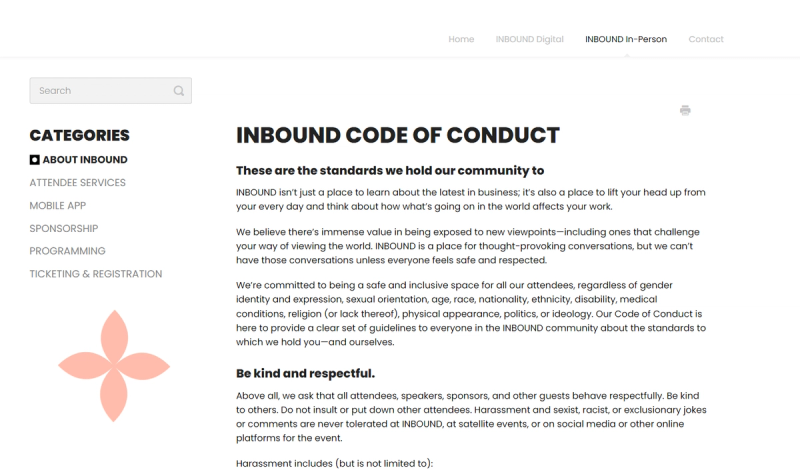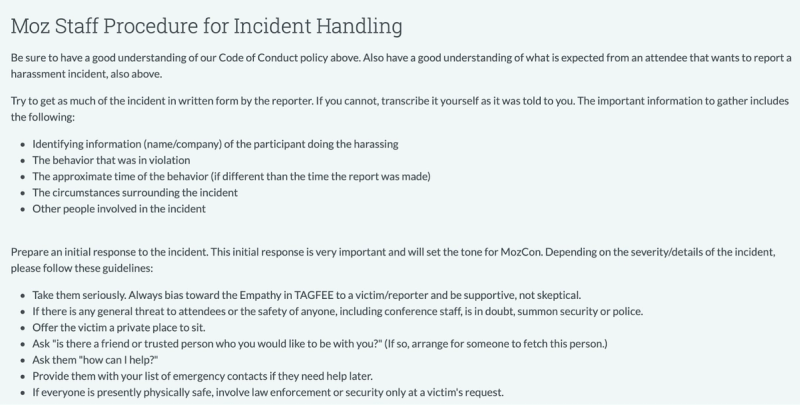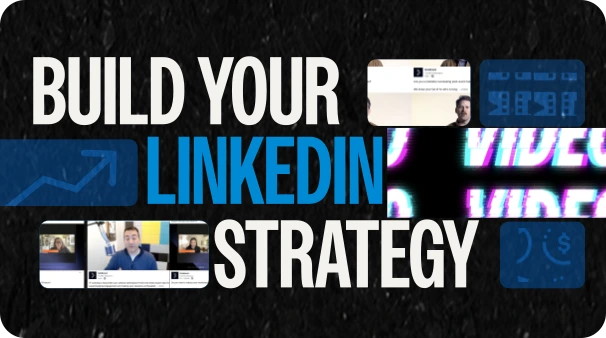Events That Are Safe and Welcoming for Everyone: 10 Code of Conduct Examples

Table of Contents
Maximize Your Marketing ROI
Join 10,000 other marketers already getting the best tips on running engaging events that boost pipeline and create raving fans.
An immeasurable amount of time, effort, and budget go into creating each and every event you produce. And while event marketers can easily spend hours planning the perfect event strategy, there’s one crucial factor that is entirely out of your control — the behavior of those in attendance.
The shared mindset, attitude, and values within a group of attendees have a huge impact on the collective experience.
So while creating an event code of conduct may not be at the top of your priority list, if you want to avoid some potentially major bumps in the road, you’ll definitely want to find time to make it happen. And be warned, this is no copy-and-paste endeavor.
The truth is, creating an event code of conduct is a lot harder than it sounds, but that doesn’t mean it has to take hours, either.
With some tangible tips for how to craft your own, plus ten examples of event codes of conduct from brands like Salesforce, SparkToro, and Adobe — you’ll have your event etiquette codified in no time.
Here’s what we’ll cover:
- What is an event code of conduct?
- Why should you create an event code of conduct?
- 9 steps to producing your own event code of conduct
- 10 crystal clear B2B event code of conduct examples
What is an event code of conduct?
The Cambridge Dictionary defines a code of conduct as: ‘a set of rules that members of an organization or people with a particular job or position must follow’.
When it comes to events, a code of conduct is there to explain what kind of behavior is and is not encouraged from those attending — whether that be as a guest, speaker, vendor, sponsor, or team member.
Because as SyndicationPro's Senior Digital Marketer, Augustin, discovered — when poor conduct takes control, your whole event suffers the consequences.
At an event I was hosting...attendees started asking me questions…and the conversation became heated as everyone turned to discuss their issues and problems with their products or services. It turned into a very hostile environment where people were arguing over things that didn't even matter.”
Why you need an event code of conduct
In this line of work, there’s no shortage of cautionary tales to beware of. Events are hard work. Unforeseen fires must be put out in real-time — often while a million other things are happening in the background.
An event code of conduct is a clear statement of what’s expected. But a truly great one also serves as an action plan for exactly what to do if something unexpected comes up.
Here are just of few of the reasons having a clear event code of conduct is a must for every modern marketer:
- A safer experience for everyone — from your catering staff to your VIP speakers, everyone should feel welcome and safe for the duration of your event
- A documented backup plan — in the heat of the moment, a strong code of conduct provides you with a process to follow that is clear and conclusive
- A clear set of expectations — attendees must be able to understand and appreciate the environment you’re creating for them. #cooltobekind
If you’re wondering which events a code of conduct is needed for, the answer is simple: all of them.
Whether you’re throwing a virtual VIP gathering or a global in-person expo, an event code of conduct will always have your back when things veer off track.
What are the best event codes of conduct? 9 steps to create your own
Now that you know what an event code of conduct actually is, these nine simple steps will help you craft your own in no time. 👇🏼
1. Start with your why — explain why you’re imposing this code of conduct and why it’s important.
✍🏻 “At Salesforce, we believe in equality for all. As such, we are committed to creating event environments that are diverse, inclusive, safe, and free from discrimination,” — Salesforce
2. Explain who your event code of conduct relates to — not just your guests but everyone in attendance are expected to comply
✍🏻 “All delegates/attendees, speakers, exhibitors, organizers, and volunteers at SparkTogether are required to conform to the following Code of Conduct.” — SparkToro
3. Set out your expectations — be clear and concise, avoid jargon, use examples, and set the tone.
✍🏻 “Harassment includes (but is not limited to): comments using demeaning, derogatory, or discriminatory language; comments intended to cause offense or harm to other members of the community; deliberate intimidation, stalking, following, or harassing photography or recording; sustained disruption of talks or other events; inappropriate physical contact; and unwelcome sexual attention.” — Hubspot
4. Detail the reporting process and how the report will be investigated — how do attendees go about informing you of concerns?
✍🏻 Aim to be as thorough as possible, like the team at Inbound:
“If you see someone behaving disrespectfully and feel safe and comfortable doing so, you are encouraged to discourage them from such behavior respectfully. If you do not feel safe, comfortable, or otherwise able to respond and resolve it respectfully, please immediately bring it to the attention of INBOUND event staff. We want to hear from you about anything you feel is disrespectful, threatening, or just icky. We will listen and work to resolve the matter.”

5. Detail the consequences should your event code of conduct be violated
✍🏻 “If a participant engages in harassing behavior, whether in person or virtually, the conference organizers may take any action they deem appropriate depending on the circumstances, ranging from issuance of a warning to the offending individual to expulsion from the conference with no refund.” — Cloud Foundry
6. Decide how you’re going to share your code of conduct with participants
✍🏻 When registering (via mandatory check box), over email prior to the event, verbalized at the start of your event, within event documentation pack, on your website, in your email signatures, etc.
7. Train all employees on how to handle code of conduct complaints
✍🏻 This is just a short snippet of the lengthy employee incident handling procedure provided by the events team at Moz:

8. Ensure it’s applicable to all event types — consider questions like how your support staff will be identified at virtual and in-person events, include references to online harassment (such as taking unauthorized screenshots and chat abuse), and provide advice on staying safe online.
✍🏻 “Keep in mind that all SparkTogether organizers will have an identifier with the words "Staff," for our virtual events, this may look like a ribbon or badge on their profile, and for in-person, it may be a piece of clothing or tag on a name badge.” — SparkToro
9. Review and revise your code of conduct regularly — and make reference to that.
✍🏻 “The Code of Conduct may be revised at any time by Salesforce.” — Salesforce
10 crystal clear B2B event code of conduct examples to inspire your own
With the key components covered, you’re ready to set about writing your own event code of conduct.
If you get stuck along the way, these 10 examples should help guide you in the right direction.
🧡 What we love: The level of detail for what is not acceptable at a Salesforce event. There’s nothing vague about this anti-harassment statement, and that’s exactly how it should be.
👉🏼 Example: “Harassment and discrimination include any verbal, physical, or visual conduct based on sex, sexual orientation, gender identity or expression, transgender status, race, age, national origin, disability. Inappropriate use of nudity and/or sexual images in public spaces (including presentation slides).”
💜 What we love: That strict enforcement is outlined in the intro and sets the tone for the code of conduct to follow.
👉🏼 Example: “Organizers will enforce this code throughout the event and won't hesitate to remove anyone who is not conforming to the code without the option for a refund or compensation.”
🧡 What we love: The clear definition of who is deemed to be a participant and to who the code of conduct applies to.
👉🏼 Example: “This policy applies to all MarketingProfs-sponsored and affiliated events, and the policies herein apply to all MarketingProfs officers, directors, attendees, speakers, exhibitors, sponsors, participants, employees, contractors, volunteers, and guests at the meeting and related events.”
💜 What we love: The robust staff instructions. Employees have a clear reference point when handling conduct complaints on the day.
👉🏼 Example: “Be sure to have a good understanding of our Code of Conduct policy above. Also, have a good understanding of what is expected from an attendee that wants to report a harassment incident, also above…please follow these guidelines…”
🧡 What we love: The razor-sharp reference to why the following code of conduct is important to Informa and who it protects — i.e., everyone.
👉🏼 Example: “We believe our community should be truly open for everyone. As such, we are committed to providing a friendly, safe and welcoming environment for all, regardless of gender, sexual orientation, disability, ethnicity, or religion.”
💜 What we love: Hate to say it. Have to say it. For a multinational mega-brand like Adobe, we were expecting a bit more — their event code of conduct is just 200 words. But we do appreciate the direct reference to attendance equating agreement when it comes to your code of conduct. That’s a crucial point that’s always worth clarifying in advance.
👉🏼 Example: “By attending Adobe Developers Live, you are agreeing to abide by this code of conduct.”
🧡 What we love: The transparent and concise step-by-step guide attendees can follow to report incidents and clear insights on how to will be handled.
👉🏼 Example: “Contact a Staff Member →Report the Harassment Issue to Staff → Gather as Much Detail as Possible → Staff Will Help You Create Your Report → If Your Safety is Threatened…venue security and/or local guards may be called → The Alleged Harasser Will be Approached…”
💜 What we love: This team takes the crown for being proactive, directly addressing any conduct concerns before the event is even underway.
👉🏼 Example: “If you are planning to attend an upcoming event, whether in-person or virtually and have concerns regarding another individual who may be present, please contact Deb Giles at dgiles@cloudfoundry.org. Precautions will be taken to ensure your comfort and safety, including, but not limited to, providing an escort, prepping onsite event staff, keeping the victim and harasser from attending the same talks/social events, and providing on-site contact cell phone numbers for immediate contact.”
🧡 What we love: The succinct and direct closing line leaves no room for confusion: it’s their way or the highway. #firmbutfair
👉🏼 Example:“If you find this policy restrictive, please do not attend or speak at the conference.”
💜 What we love: The inclusion of Inbound’s wider beliefs and values to reinforce the need for positive event conduct.
👉🏼 Example:“We believe there’s immense value in being exposed to new viewpoints — including ones that challenge your way of viewing the world. INBOUND is a place for thought-provoking conversations, but we can’t have those conversations unless everyone feels safe and respected.”
Make attendees feel safe and welcome with a clear event code of conduct
A safe and supportive learning environment is crucial to every successful event.
After all, if attendees don’t feel comfortable sharing their views, networking, and engaging with each other, then what’s the point?
Don’t mistake your event code of conduct as just another policy to tick off your list.
Crafting, sharing, and adhering to a strong code of conduct helps build trust across your entire event program, including your in-person, virtual, and hybrid events. And when it's supported by seamless engagement tools and stellar event content, you can bet your attendees will keep coming back for more.

Stay In Touch
Platform
Resources
Company
Community
© 2025 Copyright Goldcast, Inc. All rights reserved.



 Upcoming Events
Upcoming Events Event Series
Event Series On-Demand Events
On-Demand Events

